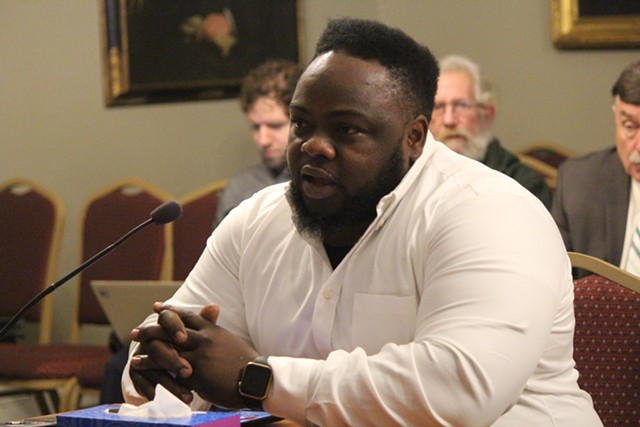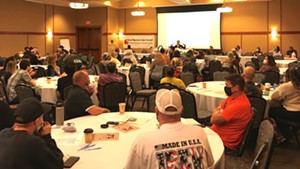
- Paul Heintz
- Adolphe Lumumba testifying before the House Judiciary Committee on Wednesday
Anako Lumumba tried to protect herself from an abusive ex, her brother told Vermont lawmakers on Wednesday. "But the system wasn't enough to take the guns away from the guy," Adolphe Lumumba said.
In May 2018, police have alleged, Leroy Headley shot Anako to death in the South Burlington home they once shared. She had repeatedly reported his threatening behavior to police — twice in the week before she was killed — but Headley still had legal access to firearms.
Reps. Maxine Grad (D-Moretown) and Martin LaLonde (D-South Burlington) are seeking to prevent such tragedies. The chair and ranking member of the House Judiciary Committee have introduced legislation that would require subjects of a restraining order to surrender their firearms. Their bill,
H.610, would also expand
the state's new "red flag law" to allow family and household members — not just law enforcement officials — to seek extreme risk protection orders, which allow for the temporary confiscation of firearms from those deemed dangerous.
Adolphe Lumumba told their committee that the bill might have helped Anako.
"I'm not here today to save my sister, but I know there's other people out there who can be saved by this," he said. "This is something my sister would have wanted, too."
The measure is one of several firearms-related bills lawmakers are considering this session.
Sen. Phil Baruth (D/P-Chittenden) has introduced legislation that would prohibit the possession of semiautomatic weapons in certain public spaces, such as government buildings, churches, hospitals, parks, restaurants, concert venues and colleges. The bill,
S.259, is sponsored by 14 of the Senate's 30 members, suggesting it may have majority support.
"We should have some commonsense limitations on where you can carry guns specifically designed to kill large numbers of people," Baruth said. "That is, you can't carry them into places where there are large numbers of people."
The Democratic legislature is also trying to determine what to do about
Republican Gov. Phil Scott's veto last session of a bill requiring a 24-hour waiting period before the purchase of a handgun. Legislators could attempt to override Scott's veto, but that would require a two-thirds majority in both chambers. While 20 senators backed the measure,
S.169, last session, only 82 of 150 members of the House did.
"I'm not sure we have the votes to override," Grad conceded.
Sen. Dick Sears (D-Bennington), who chairs the Senate Judiciary Committee, said he's hoping to allay Scott's concern that there is insufficient evidence to show that a 24-hour waiting period would reduce the state's suicide and homicide rates. To that end, Senate leaders have invited
two prominent Harvard Business School professors who have researched the question to testify next week.
"I think what we should do is work with the administration and find a path," Sears said. "And I'm willing to do that."
If that fails, Baruth plans to push for
a waiting period of 48 hours, arguing that the research is even stronger that longer waiting periods are effective. "In that sense, we are taking him at his word," Baruth said of the governor.
During a break from testimony in her committee Wednesday, Grad said she planned to focus on advancing her own bill, H.610.
"Domestic violence-related homicides are preventable," she said. "This would give survivors of domestic violence, law enforcement, the court, family, community members the tools that they don't have now to reduce access to firearms."
In addition to the restraining order and extreme risk protection order provisions, Grad and LaLonde's bill would close what's known as the "Charleston loophole." Under federal law, if a criminal background check is not completed within three days, a gun dealer may proceed with a sale. That allowed the perpetrator of a 2015 church shooting in Charleston, S.C., to purchase a gun even though he should not have been permitted to do so.
Last year's vetoed waiting-period bill also sought to close the so-called loophole by prohibiting gun sales without a completed background check. Grad said she included the same provision in her new bill because she believes it would also save lives. "For me, this is a domestic violence, homicide prevention bill," she said. "So they're all related."
During Wednesday's hearing, several witnesses raised objections to the legislation.
South Burlington Police Chief Shawn Burke said his own department could handle the increased workload that would come with the mandatory seizure of guns from those served with restraining orders. "But that's not the case around the state," he said. "Operationally, this would be a huge lift for law enforcement in the state."
Chief Superior Judge Brian Grearson similarly warned that requests for warrants and extreme risk protection orders could strain the courts — particularly after hours, when such requests are handled by lower-level personnel.

- Paul Heintz
- Ed Cutler testifies before the House Judiciary Committee on Wednesday
Gun-rights advocates, meanwhile, said the legislation would restrict their rights and make them less safe. Ed Cutler, president of Gun Owners of Vermont, said that closing the Charleston loophole could make it difficult to quickly obtain a firearm in order to ward off members of the animal kingdom.
"In Vermont, the crime rate is extremely low. The murder rate is almost nonexistent," he said. "But we have wild animals. We had a bunch of years ago a big rabies epidemic."
Cutler argued that the state's new composting rules might compound the threat.
"Bears in the spring are really hungry, and bears with cubs are very protective," he said. "You go out to that compost pile with a bear problem and you don't have a firearm, you need to get one just to defend yourself. If you can't [pass a background check in] three days, you can't defend yourself against that bear."















Comments (24)
Showing 1-24 of 24
Comments are closed.
From 2014-2020, Seven Days allowed readers to comment on all stories posted on our website. While we've appreciated the suggestions and insights, right now Seven Days is prioritizing our core mission — producing high-quality, responsible local journalism — over moderating online debates between readers.
To criticize, correct or praise our reporting, please send us a letter to the editor or send us a tip. We’ll check it out and report the results.
Online comments may return when we have better tech tools for managing them. Thanks for reading.